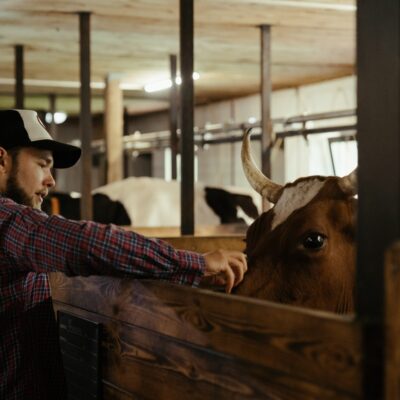Erasmus Internship: Animal production
Take part in an enriching experience with an Erasmus internship in animal production
The Erasmus+ program offers numerous opportunities for students in various fields, including agriculture and animal production. An Erasmus internship in animal production will allow you to enhance your professional skills while immersing yourself in a new culture and different agricultural practices. In this article, we will discuss the main reasons why you should consider an Erasmus internship in animal production and the various options available.
Benefits of an Erasmus Internship in Animal Production:
- International Professional Experience: Undertaking an Erasmus internship in animal production comes with several advantages, including gaining international professional experience. Working in another country exposes you to new working methods and animal production management practices, which can significantly benefit your future career.
- Language Skills Development: An internship abroad is also an opportunity to improve your language skills and learn a new language, which is a valuable asset in today’s job market.
- Expanded Professional Network: During your internship, you will meet numerous professionals in the animal production sector, allowing you to establish connections that can be valuable for your future career.
- Exploration of a New Culture: Lastly, an Erasmus internship provides the opportunity to explore a new culture and enrich your personal experience.
Various Sectors in Animal Production:
Animal production encompasses several sectors where you could undertake your Erasmus internship. Here are some examples:
Livestock and Dairy Production
Working on farms dedicated to the breeding of dairy cows, goats, or sheep involves tasks such as daily animal management, milking, feeding, reproductive monitoring, and facility maintenance.
Pig Farming
An internship in pig farming involves working with breeders specializing in pork production. Responsibilities may include handling reproduction, maternity care, fattening, and ensuring the health of the animals.
Poultry Farming
This sector includes the breeding of poultry such as chickens, turkeys, ducks, and other birds for human consumption. Tasks during a poultry farming internship are similar to other types of farming, with a focus on preventing and controlling avian diseases.
Aquaculture
Aquaculture involves the production of fish, crustaceans, and mollusks in controlled environments. An internship in this field offers the opportunity to work on fish farms, hatcheries, or sea-based breeding sites, participating in daily animal management, growth monitoring, and disease prevention.
Equine Farming
If you have a passion for horses, an internship in equine farming could be an excellent option. You’ll learn to manage all aspects of a horse’s life, from birth to training and sports career. Areas of focus may include reproduction, breaking in, training, and participation in equestrian competitions.
Finding the right Erasmus internship in animal production
There are several resources to find an Erasmus internship in animal production:
- Your Institution’s Erasmus+ Office: Inquire with your university or school’s Erasmus+ office to discover available internship opportunities. They can guide you through the application process and provide ongoing support.
- Academic Partnerships: Your institution may have specific partnerships with foreign institutions specializing in animal production. Explore these potential internship opportunities through academic collaborations.
- Online Platforms: Numerous websites feature internship offers in the field of animal production. You can also leverage professional social networks to identify opportunities and connect with overseas companies.
Preparing for an Erasmus Internship in Animal Production
Before embarking on an Erasmus internship, thorough preparation is essential:
- Research the Country and Culture: Read articles, watch videos, and talk to individuals who have lived in the country where you’ll be doing your internship. This will enhance your understanding of the local culture and help prevent potential misunderstandings.
- Enhance Language Skills: If you’re not proficient in the language of the country you’re heading to, consider taking intensive courses or using online learning apps to improve your language proficiency.
- Prepare Administrative Documents: Ensure you have all necessary documents for your mobility, including your passport, visa, health insurance, and internship agreement.
- Arrange Accommodation: Search for accommodation that suits your needs and budget before departure. University residences may be an appealing option, but explore other possibilities as well.
In summary, an Erasmus internship in animal production offers a rewarding experience both professionally and personally. So, don’t hesitate any longer—dive into this unique adventure that will allow you to develop your skills and broaden your horizons.
Find out more about our internship sector
Espamob specializes in supporting groups during their Erasmus+ mobility. Explore in just a few clicks all the Erasmus internship sectors in Spain.
Discover the sectorsRequest a free quote
Do you have an idea for an Erasmus+ project in Spain and are you looking for a trusted reference to support you? Espamob‘ is here to help you! We offer you a free, no-obligation quote to help you manage your mobility project. Thanks to our experience and our network of partner companies, we can offer you personalized support to meet your specific needs. Contact us now to discuss your project and get your free quote.
Frequently asked questions
What is the advantage of choosing Espamob for undertaking an Erasmus internship in the field of animal production?
Choosing Espamob for an Erasmus internship in animal production is advantageous due to our specific expertise in this sector. We have strong partnerships with universities and businesses specializing in animal production in Spain, allowing us to provide high-quality internship opportunities tailored to your needs. Additionally, our team will support you throughout the entire process, from project creation to on-site reception, ensuring a enriching and successful experience.
How does Espamob assist groups in securing funding for their Erasmus internship in animal production?
Espamob recognizes that funding can be a hurdle for some groups looking to undertake an Erasmus internship in animal production. That’s why we assist you in finding funding opportunities. We will provide information on various funding possibilities, such as Erasmus+ scholarships or other funding programs specific to the field of animal production. Moreover, we will help you prepare your funding applications by offering advice and resources to maximize your chances of success.
How does Espamob facilitate the reception of groups in Spain for their Erasmus internship in animal production?
Espamob streamlines the reception of groups in Spain by handling logistical organization. We take care of finding accommodations that suit your needs and budget, whether it be in university residences, host families, or shared apartments. Additionally, we ensure transportation from the airport to your place of stay. Throughout your internship, we remain at your disposal for any assistance or support you may require. Our goal is to allow you to focus on your animal production internship experience while ensuring a comfortable and secure reception in Spain.

Find out more about the different Erasmus + destinations in Spain :


